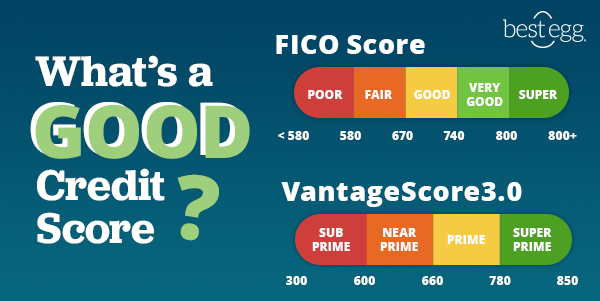
Wondering what constitutes a good credit score?
A good credit score can be crucial to your ability to access credit, land a new job or secure a new place to live. It’s hard not to obsess over that three-digit number, especially when you know you’re about to submit an application.
Your credit score can be influenced by several factors, including some that are out of your control. You know the basics—Make your payments on-time, don’t max out credit cards—but there is a lot that happens behind the scenes that also goes into calculating your credit score. Read on for the basics on what creditors will consider a ‘good’ credit score, how you can improve yours, and how your credit score can be influenced by several other factors.
What is a good credit score?

The answer is, it depends. Because of the complexity of everyone’s unique credit report, the types of credit out there, and the different scoring models, there isn’t an official threshold for a ‘Good’ credit score. Instead, two of the most popular credit scoring models, FICO and VantageScore, have ranges that can help you identify where you stand.
FICO provides the following as credit score ranges:
| Less than 580 | Poor |
| 580-669 | Fair |
| 670-739 | Good |
| 740-799 | Very Good |
| 800+ | Exceptional |
For FICO scores, a good credit score ranges from 670-739.
While VantageScore3.0 provides these ranges to evaluate credit scores:
| 300-600 | Subprime |
| 601-660 | Near prime |
| 661-780 | Prime |
| 781-850 | Superprime |
For VantageScore 3.0, a good credit score is considered ‘Prime’ and ranges from 661-780.
But wait, I have a 680 FICO from Experian, but Credit Karma says I have a 698 VantageScore!
Lesson Two: There are several types of credit scores and models.
Have you ever noticed that your FICO credit score is slightly different from one credit bureau to another? That’s because while all three major credit reporting agencies (Equifax, Experian and TransUnion) use data in your credit reports, they calculate that data differently. The main reasons your credit scores look different are:
- Your credit reports are not based on the same dates. If you’ve recently opened or paid off a large amount, your score might not reflect your most recent updates.
- Different scoring models are used to calculate your score. For example, if you’re applying for a mortgage or an auto loan, your credit score may be different than the credit score you see through a credit monitoring app like Credit Karma.
- Some lenders may only report to one or two of the major reporting agencies, which means your credit reports are different from one agency to another. This means that your scores, which are based off your credit report, may be different among Equifax, Experian and TransUnion.
If all of that is making your head spin, have no fear. Here’s the gist:
Most financial experts will generally agree that a score above 700 unlocks most credit opportunity. While your credit scores are likely different from one credit reporting agency to another, or from one credit reporting app to another, it’s important not to get caught up in the subtle differences that you can’t change. The key is to focus on what you can do to improve and maintain a good score.
What goes into a good credit score?
While it is important to know the way that creditors may look at your credit score, it is crucial to know what goes into a credit score.
Your VantageScores and FICO scores are calculated on five components included in your credit report:
- Payment history
- Amounts owed (also called credit utilization)
- Length of credit history
- New credit
- Credit mix
For FICO scores, your payment history and the amounts owed are usually the two most influential components of your credit score. Pro Tip: FICO scores are more widely used in credit applications than VantageScores.
For VantageScore3.0, your amounts owed and credit mix are the two most influential components, while payment history falls to the third most important component.
Waxing Poetic About Good Credit Scores
Keeping up a good credit score can help in a lot of places in your life, but it’s also important to keep in mind that your credit score is just a number.
Your credit score can differ when it’s being accessed, calculated by which credit reporting agency, using which credit scoring model—so remember, that three-digit number is just one factor taken into consideration when applying for credit, a job, or an apartment.
You can have a good credit score and still not qualify for credit. Likewise, you may not have a good credit score as defined by FICO or VantageScore 3.0, but you may still be able to secure affordable credit.
Is it important to keep track of your credit score? Yes. Is it important to maintain a good credit score? Yes. Is it the most important number in your life? There’s a ‘good’ chance that’s not the case.
This article is for educational purposes only and is not intended to provide financial, tax or legal advice. You should consult a professional for specific advice. Best Egg is not responsible for the information contained in third-party sites cited or hyperlinked in this article. Best Egg is not responsible for, and does not provide or endorse third party products, services or other third-party content.